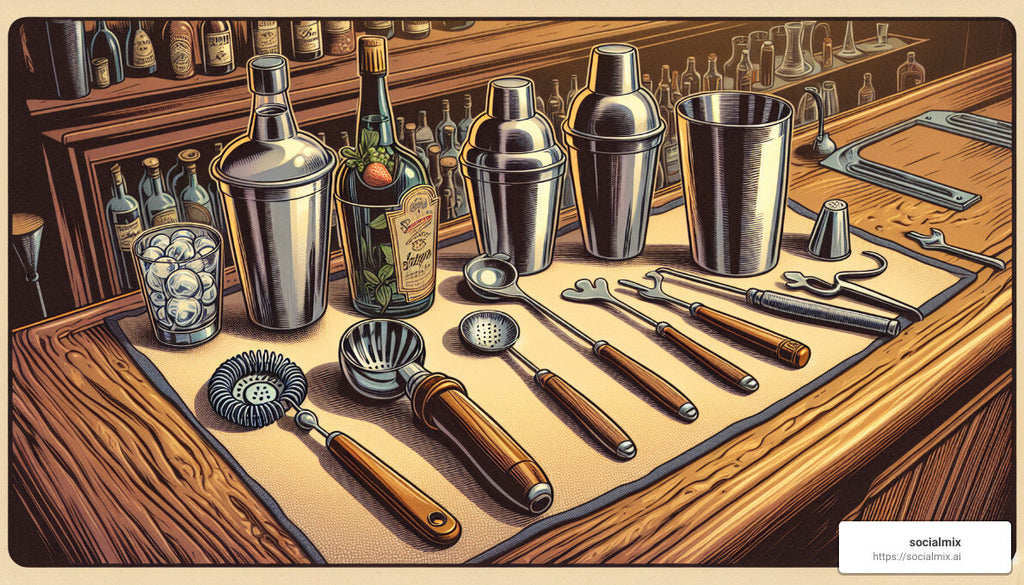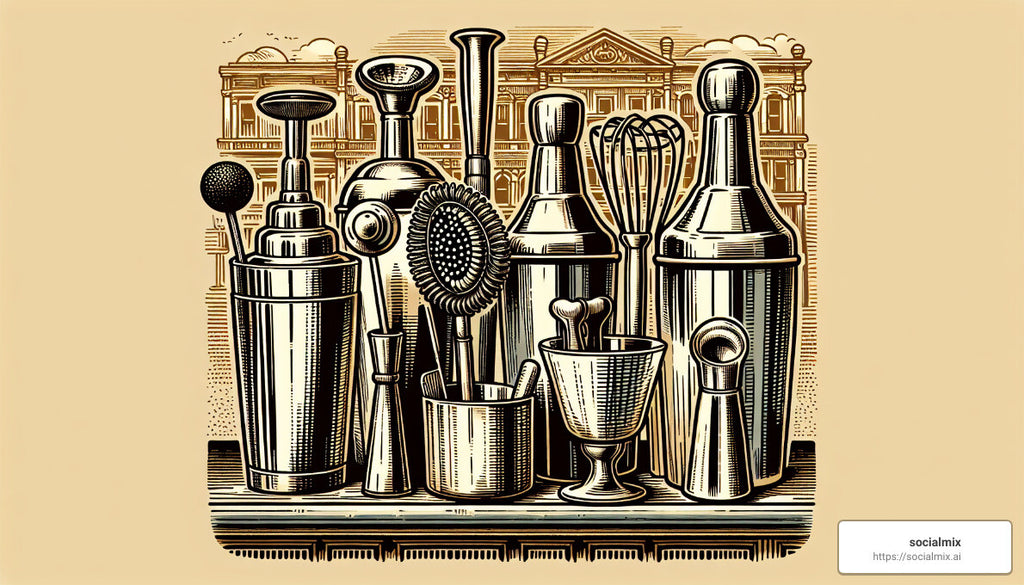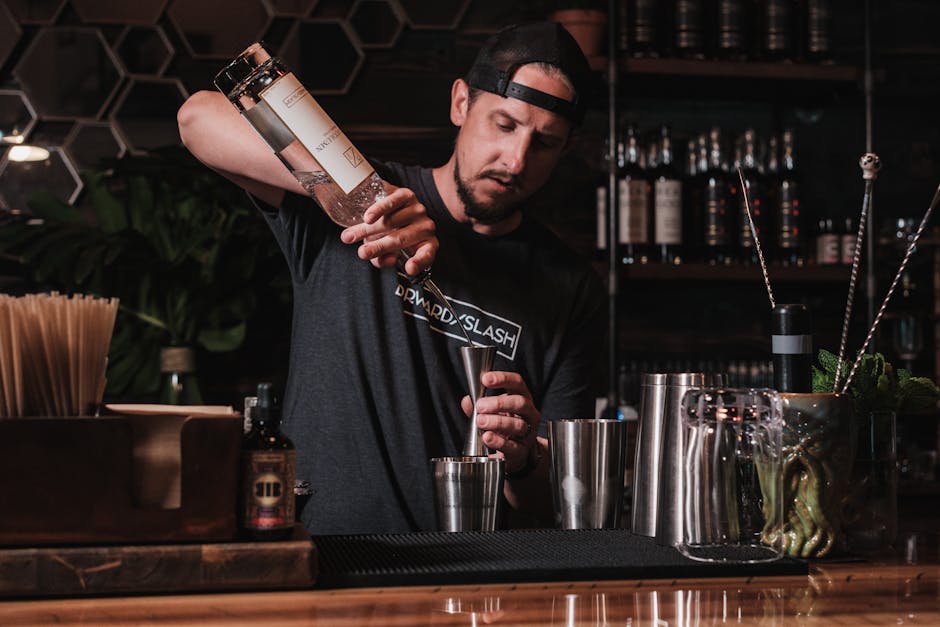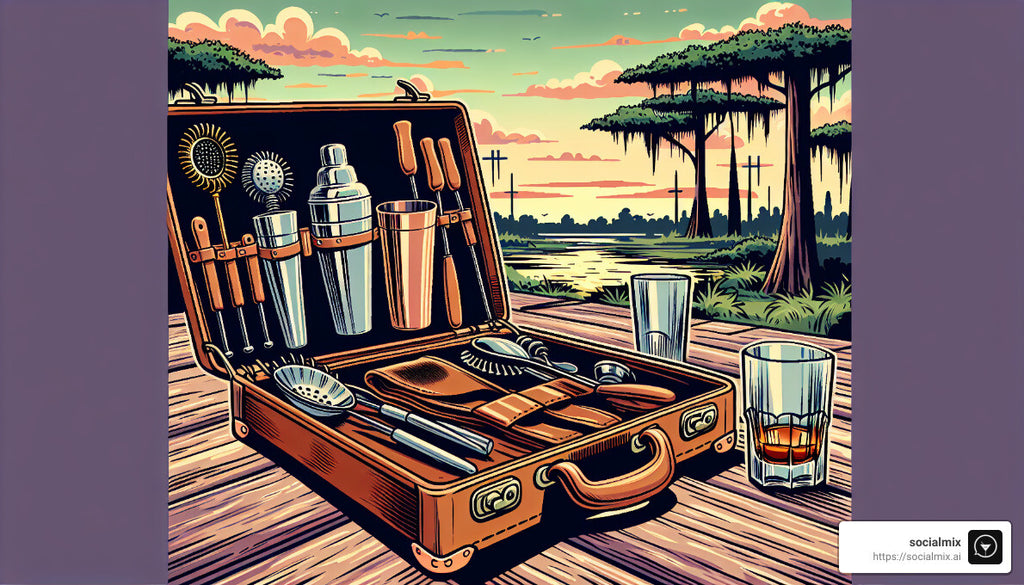Behind the Bar: What Is a Mixologist?

The Art of Mixology: Crafting the Perfect Cocktail
What is a mixologist? Simply put, a mixologist is an expert in the art and science of creating cocktails. They study the history, ingredients, and techniques behind both classic and innovative drinks, bringing a deeper level of craftsmanship to the bar.
Quick Definition of a Mixologist: - Expert in Crafting Cocktails: Studies the history and ingredients of mixed drinks. - Innovative and Creative: Develops new cocktails using unique flavor combinations. - Knowledgeable: Understands the chemistry behind how drink ingredients interact.
The term "mixologist" has been around since the 1860s, but it has seen various trends in popularity. Today, thanks to the rise of craft cocktails and social media, mixology is once again at the forefront of the bar scene. This resurgence is driven by a new generation of cocktail enthusiasts who appreciate both the artistry and the science behind every drink.
Understanding the role of a mixologist is important in appreciating the depth and complexity that goes into every cocktail. Unlike a traditional bartender focused on service and efficiency, a mixologist dives deep into flavors, techniques, and presentation, often setting new trends in the beverage industry. This distinction is not just about making drinks but creating unforgettable experiences.

What is a mixologist word roundup: - how long does it take to become a mixologist - how to be a good mixologist - mixologist vs bartender
What Is a Mixologist?
The Role of a Mixologist
A mixologist isn't just a bartender who makes drinks; they are artists and scientists of the cocktail world. While bartenders focus on serving customers quickly and efficiently, mixologists dig into the craft of creating innovative and balanced cocktails. They understand the history of drinks, why certain ingredients work well together, and how to use various techniques to create unique flavors.
Key Responsibilities of a Mixologist: - Inventing New Cocktails: Mixologists use their deep knowledge of ingredients and techniques to create new and exciting drinks. They experiment with flavors, textures, and presentations to craft unique cocktails that stand out. - Understanding Ingredients: Just like a chef knows their spices, a mixologist knows their spirits, mixers, and garnishes. They understand how different ingredients interact and how to balance flavors to create a harmonious drink. - Staying on Top of Trends: Mixologists are always aware of the latest trends in the beverage industry. This includes using unique and local ingredients, reviving classic cocktails, and incorporating sustainable practices.
How to Become a Mixologist
Becoming a mixologist requires more than just knowing how to use a cocktail shaker. It involves formal training, gaining experience, and continuously learning and experimenting.
Steps to Become a Mixologist: 1. Bartending Training: Start with bartending school to learn the basics of making drinks, maintaining a bar, and providing excellent customer service. 2. Certifications: Many mixologists earn certifications from mixology courses. These courses cover advanced techniques, the history of cocktails, and the science behind mixing drinks. 3. Experience: Practical experience is crucial. Working behind a bar helps aspiring mixologists understand customer preferences and improve their drink-making skills. 4. Continuous Learning: The world of mixology is always changing. Successful mixologists stay updated on new trends, take additional classes, and experiment with new ingredients and techniques.

Quote from Nico De Soto: "A bartender tends the bar but a mixologist experiments with different flavours and techniques." This highlights the difference in focus between the two roles.
Fun Fact: The term "mixologist" first appeared in the 1860s, thanks to pioneers like Jerry Thomas, who is often considered the father of American mixology.
Specialized Knowledge and Cocktail History
Mixologists have a deep understanding of cocktail history and the evolution of drinks. This historical knowledge helps them appreciate the classics and innovate new creations.
Classic Cocktails: Mixologists often start with classic recipes like the Old Fashioned, Martini, or Manhattan. Understanding these basics allows them to tweak and create new variations.
Modern Innovations: Today, mixologists use a variety of modern techniques, including molecular gastronomy, to create new textures and flavors. They might use foams, gels, or even sous-vide methods to infuse spirits.
Trends Influencing Mixology
The mixology world is ever-changing, with new trends emerging regularly.
Current Trends: - Unique Ingredients: Using local and seasonal ingredients to create fresh and unique flavors. - Sustainability: Focusing on eco-friendly practices, such as reducing waste and using sustainable ingredients. - Technology: Incorporating modern technologies like sous-vide and molecular techniques to create innovative cocktails.
Understanding these trends helps mixologists stay relevant and continue to excite their customers with new and interesting drinks.
Next, we'll explore the fascinating history of mixology, from its early days to its modern resurgence.
The History of Mixology
Mixology, the art of creating mixed drinks, has a rich and fascinating history. It has evolved from its early days to the modern cocktail culture we enjoy today. Let's explore some key historical figures and periods that have shaped mixology.
Jerry Thomas: The Pioneer
Jerry Thomas, often called the "father of American mixology," revolutionized bartending in the 19th century. Known as "The Professor," Thomas was a true innovator. He owned several saloons in New York City and published The Bartender's Guide: How to Mix Drinks in 1862, the first cocktail recipe book in the United States.
Signature Cocktails: - The Blue Blazer: Thomas's most famous creation, made with sugar, scotch, and boiling water, which he lit on fire and poured back and forth between two glasses. This not only created a unique flavor but also a spectacular visual display. - The Martinez: An early version of the Martini, showcasing Thomas's skill in balancing flavors.
Jerry Thomas's approach to cocktails wasn't just about the drinks; it was about the entire experience. His showmanship and creativity set the standard for future generations of mixologists.
Prohibition Era: The Golden Age of Cocktails
The Prohibition era (1920-1933) was a challenging time for alcohol enthusiasts in the United States. The 18th Amendment banned the manufacture, transport, and sale of alcohol. However, this period also became a golden age for cocktails.
Speakeasies: To enjoy their favorite drinks, people flocked to underground bars known as speakeasies. Bartenders had to get creative with limited ingredients, leading to the invention of many classic cocktails we love today.
Innovative Cocktails: - Bee's Knees: Gin, honey, and lemon juice. - Gin Rickey: Gin, lime juice, and soda water. - Sidecar: Cognac, orange liqueur, and lemon juice.
Prohibition forced mixologists to experiment with new flavors and techniques, laying the groundwork for modern mixology.
Modern Resurgence: Craft Cocktails and Innovation
After Prohibition ended with the 21st Amendment in 1933, the cocktail culture continued to evolve. The post-WWII era saw cocktails becoming a staple of social gatherings. However, it wasn't until the late 20th and early 21st centuries that mixology experienced a true renaissance.
Dale DeGroff: King Cocktail
Dale DeGroff, known as "King Cocktail," played a pivotal role in this resurgence. Working at the Rainbow Room in New York City during the 1980s, DeGroff emphasized fresh ingredients and precise techniques. His book, The Craft of the Cocktail, is a must-read for aspiring mixologists.
Bannie Kang: World Class Champion
Bannie Kang, originally from South Korea, has made a significant impact on the global mixology scene. After winning the World Class bartending competition in 2019, she opened "Mu" in Taipei with her husband. Kang's ability to blend traditional techniques with modern flavors sets her apart.
Key Takeaways
- Jerry Thomas: The pioneer who transformed bartending into a respected profession.
- Prohibition Era: A time of creativity and innovation in cocktail making.
- Modern Resurgence: Led by figures like Dale DeGroff and Bannie Kang, who continue to push the boundaries of mixology.
Next, we'll dive into the daily responsibilities of a mixologist and the essential tools they use to create their masterpieces.
Responsibilities of a Mixologist
Daily Tasks
The role of a mixologist is dynamic and involves several key responsibilities that go beyond just mixing drinks. Here are the core daily tasks:
Serving Drinks: Mixologists are experts at crafting both classic and signature cocktails. They follow precise recipes and also create new ones, ensuring every drink is a masterpiece.
Bar Management: Keeping the bar well-stocked and organized is crucial. This includes managing supplies like glasses, garnishes, and drink mixes. A mixologist often uses advanced inventory systems like BinWise Pro to track stock levels efficiently.
Customer Satisfaction: Ensuring guests are happy with their drinks and overall experience is a top priority. This means not only making great cocktails but also engaging with customers to understand their preferences.
Inventory Management: Keeping tabs on the bar's inventory is essential. This involves checking stock levels, ordering supplies, and ensuring nothing runs out during busy periods. Accurate inventory tracking helps maintain smooth operations.
POS System: A mixologist must be adept at using a Point of Sale (POS) system to process payments. This includes handling cash and card transactions, ensuring accuracy, and maintaining financial records.
Customer Interaction: Engaging with customers, answering their questions, and recommending drinks based on their tastes is part of the job. Good customer interaction can improve the overall bar experience and keep patrons coming back.
Tools of the Trade
A mixologist's toolkit is essential for crafting perfect cocktails. Here are some of the must-have tools:
Cocktail Muddler: This tool is used to crush ingredients like herbs and fruits, releasing their flavors into the drink. It's a staple for creating fresh and aromatic cocktails.

Cocktail Strainer: After shaking or stirring a cocktail, a strainer is used to remove ice and other solids. This ensures a smooth, clean drink.

Mixology Set: A comprehensive set includes various tools like shakers, jiggers, bar spoons, and more. Each tool has a specific purpose and helps in creating precise and well-balanced drinks.

By mastering these daily tasks and using the right tools, a mixologist can lift the bar experience, ensuring customers enjoy every sip of their expertly crafted cocktails.
Next, we'll explore the differences between mixologists and bartenders, shedding light on what sets them apart.
Mixologist vs Bartender
Mixologists Serve Drinks, Bartenders Serve Customers
Mixologists and bartenders may seem similar, but their roles and skills are quite different. Let's break down the distinctions.
Service Focus
Bartenders focus on customer service. They interact with patrons, take orders, and ensure everyone has a good time. Think of the bartender in the TV show Cheers, who knew everyone's name and favorite drink.
Mixologists, on the other hand, focus on the craft of making drinks. They experiment with flavors, techniques, and presentations to create unique cocktails. They are like chefs for cocktails, always looking for new ways to surprise and delight customers.
Skill Levels
Bartenders are skilled at making a wide variety of drinks quickly. They need to handle the pressure of a busy bar, making sure no one waits too long. Their skills include:
- Speed and efficiency: Bartenders can mix and serve drinks fast.
- Customer service: They are great at engaging with patrons and making them feel welcome.
- Bar maintenance: Keeping the bar clean and well-stocked is a key part of their job.
Mixologists have specialized knowledge in creating complex and innovative cocktails. Their skills include:
- Recipe creation: Mixologists experiment with ingredients to craft unique drinks.
- Ingredient knowledge: They understand the molecular properties of different ingredients.
- Trend awareness: Mixologists stay ahead of cocktail trends and often set new ones.
Customer Interaction
Bartenders excel in customer interaction. They engage with patrons, listen to their stories, and create a welcoming atmosphere. This personal touch is crucial for building a loyal customer base.
Mixologists may not interact with customers as much. Their main focus is on creating the perfect drink. However, they do engage with patrons by explaining their creations and answering questions about cocktails.
Customer Service
Bartenders are the face of the bar. They provide excellent customer service, ensuring patrons have a great experience. They remember regulars' favorite drinks and often lend a sympathetic ear.
Mixologists serve drinks, but their primary focus is on the quality and creativity of their cocktails. They aim to provide an exceptional drink experience, even if they don't spend as much time interacting with customers.
Drink Creation
Bartenders are adept at making a wide range of drinks, from classic cocktails to simple beers. They ensure each drink is made to perfection and served promptly.
Mixologists take drink creation to the next level. They use exotic ingredients, advanced techniques, and innovative presentations. Their goal is to create one-of-a-kind masterpieces that stand out.
Bar Maintenance
Bartenders are responsible for maintaining the bar area. This includes:
- Cleaning: Keeping the bar clean and organized.
- Stocking: Ensuring there are enough supplies like glasses and garnishes.
- Inventory management: Tracking stock levels and ordering supplies.
Mixologists also manage bar inventory but often focus on sourcing unique ingredients and tools for their creations.
In summary, while both roles are essential, bartenders focus on customer service and efficient drink-making, whereas mixologists concentrate on the art and science of cocktail creation. Both bring valuable skills to the bar, but their focus areas set them apart.
The Modern Mixologist
Trends in Mixology
Today's mixologists are at the forefront of several exciting trends, blending traditional techniques with modern innovations to create unique and memorable cocktail experiences. Let's explore some of the key trends shaping mixology today.
Craft Cocktails
Craft cocktails are all about quality and creativity. Mixologists use super-premium spirits and handpicked ingredients to craft drinks that are both delicious and visually stunning. This trend has been bolstered by the rise of the craft distilling movement, which offers a broader palette of flavors and textures to work with.
Example: The Negroni is a classic craft cocktail that has seen a resurgence. Made with gin, Campari, and sweet vermouth, it's a perfect balance of bitter and sweet.
Sustainability
Sustainability is a growing focus in mixology. Mixologists are increasingly using seasonal and locally sourced ingredients to reduce waste and support local agriculture. This aligns with a broader societal push towards environmental responsibility.
Quote: "My current preference is to use tech to explore the preservation of seasonal ingredients," says Zoe Burgess, founder of independent drinks consultancy Atelier Pip.
Social Media Influence
Platforms like Instagram have turned mixologists into social media celebrities. The visual appeal of a beautifully crafted cocktail can attract thousands of followers. This has led to an emphasis on presentation, with elaborate garnishes and unique glassware becoming the norm.
Example: Erika Moore and Raquel Ravenell, the duo behind Whiskey And Rosemary, use intriguing ingredients like eucalyptus raw cane syrup and aquafaba to create visually stunning cocktails.
Unique Ingredients
Experimentation with unique ingredients is another hallmark of modern mixology. From exotic fruits to infused spirits, mixologists are constantly pushing the boundaries of flavor.
Example: The Espresso Martini combines vodka, coffee-flavored liqueur, and freshly brewed espresso for a caffeinated twist.
Classic Cocktails
While innovation is key, many mixologists also draw inspiration from classic cocktails. These timeless drinks provide a foundation upon which new creations can be built.
Example: The Old Fashioned is a classic cocktail that remains a favorite. Made with whiskey, sugar, water, and bitters, it's simple yet sophisticated.
Technology in Cocktails
Modern mixologists are embracing technology to create new and exciting drinks. Techniques like molecular gastronomy, sous-vide infusions, and even the use of Rotavapors are adding new dimensions to the cocktail experience.
Quote: "Molecular mixology, introducing elements like foams and gels, has added a new dimension to cocktail experiences," says Maroš Dzurus, venue manager at Himkok.
In conclusion, the modern mixologist is a blend of artist and scientist, constantly innovating while respecting the traditions of the past. Whether it's through the use of unique ingredients, sustainable practices, or the latest technology, today's mixologists are redefining what it means to create the perfect cocktail.
Next, let's dig into the frequently asked questions about mixologists to clear up any remaining queries you might have.
Frequently Asked Questions about Mixologists
What Is the Difference Between a Bartender and a Mixologist?
A bartender is primarily focused on serving drinks and maintaining the bar. They interact with customers, take orders, and ensure the bar area is clean and well-stocked. Bartenders are essential for the smooth operation of any bar.
A mixologist, on the other hand, is like the chef of the bar world. They specialize in the art and science of crafting cocktails, often experimenting with ingredients and techniques to create unique and complex drinks. Mixologists understand the history and molecular properties of ingredients, allowing them to develop new cocktail recipes and train bartenders on these preparations.
Example: While a bartender can make a classic Martini, a mixologist might create a new twist on the Martini using infused spirits and house-made bitters.
Do Mixologists Make More Money Than Bartenders?
In general, mixologists and bartenders earn similar salaries. According to industry data, both professions have comparable wage ranges. The median hourly wage for bartenders is around $15.15, with annual earnings hovering around $31,510. However, tips can significantly boost income, with some bartenders making between $200 to $2,000 a day in tips, especially in busy or high-end venues.
Specific Cases: - In high-end cocktail bars, mixologists might earn more due to their specialized skills. - In establishments with high customer turnover, bartenders might make more from sheer volume of tips.
Overall, the salary difference isn’t substantial, but individual circumstances and locations can influence earnings.
Can You Become a Mixologist Without Formal Training?
Yes, it’s possible to become a mixologist without formal training. Many successful mixologists have learned their craft through practical experience, experimentation, and a passion for mixology.
Practical Experience: Working in bars, starting as a barback, or taking bartending jobs can provide hands-on learning opportunities. Experimentation: Trying out new recipes and techniques at home or in a professional setting helps build skills. Learning from Others: Gathering inspiration and knowledge from seasoned professionals can be invaluable.
However, formal training can offer a structured foundation. Many states require a bartender’s license to serve alcohol, which can be obtained through bartending schools or online courses. These programs typically cost between $100 and $500 and include assessments.
Quote: "It's not about the cocktail. It's about the person that is going to drink it," says Field, emphasizing the importance of customer experience.
In conclusion, while formal training can be beneficial, practical experience and a passion for the craft are equally important in becoming a successful mixologist.
Next, let’s explore the history of mixology and how it has evolved over time.
Conclusion
Summary
In our journey through "what is a mixologist," we've explored the art and science behind crafting unique and memorable cocktails. We've seen how mixologists, like chefs, innovate and lift the drinking experience with their deep understanding of ingredients and techniques. Unlike bartenders who focus on service, mixologists are the creative minds pushing the boundaries of cocktail culture.
Socialmix
At socialmix, we believe that great cocktails are more than just drinks—they're experiences that bring people together. Whether you're a seasoned mixologist or just starting out, our tools and resources are designed to improve your social gatherings and make every moment memorable. From cocktail shakers to muddlers, we provide everything you need to craft exceptional drinks.
Explore our featured collection to find the perfect tools for your next cocktail trip.
Future of Mixology
The future of mixology is bright and full of possibilities. With a growing focus on sustainability, local ingredients, and innovative techniques, mixologists are continually redefining what a cocktail can be. Social media platforms like Instagram are also playing a significant role, allowing mixologists to share their creations and inspire others globally.
As we look ahead, we expect to see more emphasis on eco-friendly practices, such as reducing waste and using locally sourced ingredients. Technology will also continue to influence mixology, with advancements like molecular mixology and sous-vide infusions becoming more mainstream.
At socialmix, we're excited to be part of this evolving landscape. We support both bartenders and mixologists in their quest to create unforgettable experiences. Whether you're hosting a casual get-together or a high-end soirée, the right tools and knowledge can make all the difference.
Cheers to unforgettable moments and exceptional cocktails!
For more insights and tools to lift your cocktail game, visit socialmix.




Leave a comment